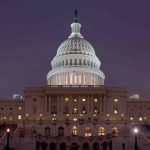Well, I could have taken up the subject of the deteriorating condition of U.S./Soviet, excuse me, U.S./Russian relations. But there are only so many windmills that I have time to tilt at.
So, rather than tracing the dissolution of bilateral GNSS cooperation in the wake of Russia’s reclaiming the Crimea and, who knows, perhaps eventually a large swath of eastern Ukraine, I thought I’d turn to an only slightly more remediable issue — GNSS carriage requirements.
Well, I could have taken up the subject of the deteriorating condition of U.S./Soviet, excuse me, U.S./Russian relations. But there are only so many windmills that I have time to tilt at.
So, rather than tracing the dissolution of bilateral GNSS cooperation in the wake of Russia’s reclaiming the Crimea and, who knows, perhaps eventually a large swath of eastern Ukraine, I thought I’d turn to an only slightly more remediable issue — GNSS carriage requirements.
First, we suffer through the agonizing weeks of the fruitless search for the missing Malaysian Airlines Flight 370. And all the time we’ve known that the capability for tracking the errant jet — satcom + GPS — has been around for probably 20 years.
Then we learn of the European Commission’s consideration of a requirement that Galileo be made mandatory for new mobile devices — ostensibly as part of an e112 automatic location capability for emergency calls from cell phones and so forth.
If that effort specifies Galileo rather than a general GNSS requirement, it would look more like the protectionism of Russia’s efforts to require GLONASS capability on equipment sold or used there than the U.S. E911 mandate, which declared “technology neutrality” in implementing a similar scheme.
Slogging forward, I recently read in our local newspaper that the U.S. Department of Transportation (DoT) issued an emergency order on May 8 requiring railroads to inform state emergency management officials about large shipments of crude oil moving through their states.
What the DoT can’t do, the agency emphasized, is require railroads to carry this hazardous material in safer double-shell tank cars, let alone insist on real-time tracking of dangerous cargo.
It was a John Oliver/Last Week Tonight moment: Let me get this straight — the DoT can force paperwork requirements on companies performing safety-related services, but they can’t actually insist that the rail industry equip their vehicles to ensure public safety?
Of course, the rail industry has been successfully resisting automatic train control technology for about as long as the aviation industry has gone lassez-faire on tamper-proof aircraft tracking.
So, imagine my dismay when on May 9 I open the newspaper to discover a front-page story headlined, “Oregon has no plan for river spills by oil trains.”
That came on the heels of the state’s abandonment of its online health insurance website after spending a quarter billion dollars on it — a fiasco neatly pilloried on HBO’S Last Week Tonight.
To appropriate Oliver’s observation, these have been bitter pills to swallow for this third-generation Oregonian.
Clearly, the idea of a federal agency requiring life-critical information be sent to state officials who have no plans for using it does not represent the finest moment for governance in America.
The solution, however, is not to do away with or rein in public entities’ efforts to protect and serve the commonwealth. Instead, we need to find effective agents for implementing real safety-of-life mandates.
For the United States, that would be Congress and the White House, which have been in a race to the bottom of public opinion polls during the last six years — a well-deserved assessment of their quarrelsome and ineffective behavior.
Globally, organizations, such as International Civil Aviation Organization, and industry groups such as the International Air Transport Association, should become agents of change rather than merely defenders of institutional equities or setters of standards that industry and public regulators can ignore.
As for curbing protectionism, that is nominally a responsibility of multilateral groups such as the World Trade Organization, which has proven more effective at removing environmental and labor protections than maintaining a level playing field. So, other forums or bilateral channels may need to be found.
In short, mandating a specific GNSS for proprietary or national advantage – bad; requiring GNSS equipment carriage for public benefit – good.




